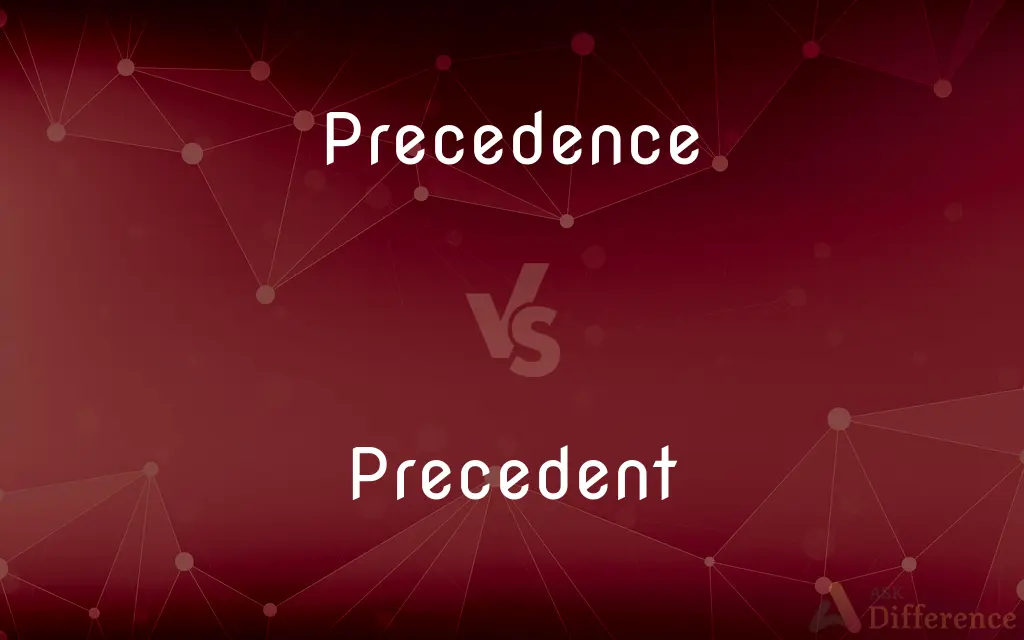Precedence vs. Precedent — What's the Difference?
By Urooj Arif & Fiza Rafique — Updated on March 7, 2024
Precedence refers to the priority order, often in context or time, whereas precedent is an example or guide formed by past decisions.

Difference Between Precedence and Precedent
Table of Contents
ADVERTISEMENT
Key Differences
Precedence is about the order in which things occur or are considered, often emphasizing a hierarchy or priority in various contexts, such as legal, social, or procedural settings. On the other hand, precedent focuses on past occurrences or decisions that serve as a reference point or example for future actions, particularly in legal cases or standards of practice.
While precedence establishes a sequence or importance that must be followed, precedent provides a basis for judgment or decision-making, relying on historical instances or outcomes. Precedents are particularly influential in legal systems, where they guide the application of law based on previously adjudicated cases.
Precedence is dynamic and can change based on context, rules, or authority, affecting how processes or people are prioritized. Conversely, precedent, once established, remains a stable reference until challenged or overruled by a new decision or interpretation, indicating a more static nature in its application.
In many professional or ceremonial settings, precedence dictates the protocol, determining the order of authority or procedure. Precedent, however, shapes expectations and actions by providing a model or guide based on historical examples, influencing behavior or decisions within established frameworks.
Precedence is applicable across various fields, indicating a broad utility in organizing or structuring. Precedent, while also broadly applicable, is especially significant in legal, moral, or ethical contexts, where it underscores the importance of consistency and reasoned decision-making based on past judgments.
ADVERTISEMENT
Comparison Chart
Definition
The condition of being considered more important
An earlier event or action used as an example
Context
Hierarchical, procedural, social
Legal, ethical, historical
Function
Establishes order or priority
Serves as a guide or model
Stability
Can change based on context or authority
Relatively stable, changes with new rulings
Application
Broad, in various fields
Primarily in legal, moral, ethical contexts
Compare with Definitions
Precedence
The act of preceding in time or order.
The ceremonial procession followed a strict order of precedence.
Precedent
A previous case or legal decision that may be or (bindingly) is to be followed in subsequent similar cases.
The judge’s ruling was based on a precedent set by earlier cases.
Precedence
Priority in time, order, or importance.
In emergency rooms, cases of higher precedence receive attention first.
Precedent
An example that is used to justify similar occurrences.
Setting a dangerous precedent, the company's policy could affect industry standards.
Precedence
A principle that determines the order of importance.
Military ranks are structured based on precedence.
Precedent
An instance serving as a guide in later instances.
This event sets a precedent for how we celebrate achievements.
Precedence
A guideline for determining the sequence of actions.
In software development, operator precedence dictates the calculation order.
Precedent
A benchmark for future actions or decisions.
Her achievements set a new precedent for excellence in the field.
Precedence
The state of being more important than another in the same group.
Safety takes precedence over convenience in aviation regulations.
Precedent
A standard or guide that influences future decisions.
The board’s decision created a precedent for handling disputes.
Precedence
The fact, state, or right of coming before in time, order, or position
Applications arriving first will receive precedence in processing.
Precedent
A precedent is a principle or rule established in a previous legal case that is either binding on or persuasive without going to courts for a court or other tribunal when deciding subsequent cases with similar issues or facts. Common-law legal systems place great value on deciding cases according to consistent principled rules, so that similar facts will yield similar and predictable outcomes, and observance of precedent is the mechanism by which that goal is attained.
Precedence
Priority claimed or received because of greater importance
The prospect of big investment returns took precedence over limiting risk.
Precedent
An act or instance that may be used as an example in dealing with subsequent similar instances.
Precedence
A ceremonial order of rank or preference, especially as observed on formal occasions
Recipients of military honors were called in order of precedence—highest ranking officers first.
Precedent
(Law) A judicial decision that is binding on other equal or lower courts in the same jurisdiction as to its conclusion on a point of law, and may also be persuasive to courts in other jurisdictions, in subsequent cases involving sufficiently similar facts.
Precedence
The state of preceding in importance or priority.
Family takes precedence over work, in an emergency.
Precedent
Convention or custom arising from long practice
The president followed historical precedent in forming the Cabinet.
Precedence
Precedent.
Precedent
Preceding.
Precedence
The act or state of preceding or going before in order of time; priority; as, one event has precedence of another.
Precedent
An act in the past which may be used as an example to help decide the outcome of similar instances in the future.
Precedence
The act or state of going or being before in rank or dignity, or the place of honor; right to a more honorable place; superior rank; as, barons have precedence of commoners.
Which of them [the different desires] has the precedency in determining the will to the next action?
Precedent
(legal) A decided case which is cited or used as an example to justify a judgment in a subsequent case.
Precedence
Status established in order of importance or urgency;
...its precedence as the world's leading manufacturer of pharmaceuticals
National independence takes priority over class struggle
Precedent
An established habit or custom.
Precedence
Preceding in time
Precedent
The aforementioned (thing).
Precedence
The act of preceding in time or order or rank (as in a ceremony)
Precedent
The previous version.
Precedent
(obsolete) A rough draught of a writing which precedes a finished copy.
Precedent
Happening or taking place earlier in time; previous or preceding.
Precedent
Coming before in a particular order or arrangement; preceding, foregoing.
Precedent
To provide precedents for.
Precedent
To be a precedent for.
Precedent
Going before; anterior; preceding; antecedent; as, precedent services.
Precedent
Something done or said that may serve as an example to authorize a subsequent act of the same kind; an authoritative example.
Examples for cases can but direct as precedents only.
Precedent
A preceding circumstance or condition; an antecedent; hence, a prognostic; a token; a sign.
Precedent
A rough draught of a writing which precedes a finished copy.
Precedent
A judicial decision which serves as a rule for future determinations in similar or analogous cases; an authority to be followed in courts of justice; forms of proceeding to be followed in similar cases.
Precedent
An example that is used to justify similar occurrences at a later time
Precedent
(civil law) a law established by following earlier judicial decisions
Precedent
A system of jurisprudence based on judicial precedents rather than statutory laws;
Common law originated in the unwritten laws of England and was later applied in the United States
Precedent
A subject mentioned earlier (preceding in time)
Precedent
Preceding in time, order, or significance
Common Curiosities
What is a precedent?
A precedent is a previous event, decision, or action that serves as a model or guide for future similar circumstances.
Can precedence change over time?
Yes, precedence can change based on new rules, contexts, or authority decisions.
Is a legal precedent always binding?
In common law systems, a precedent is often binding but can be overruled or distinguished by higher courts.
How do precedence and precedent differ in legal contexts?
Precedence determines the order of consideration, while precedent guides decision-making based on past legal decisions.
How are new precedents established?
New precedents are established through novel decisions or actions that then serve as a reference for future cases.
How does precedence affect protocol and etiquette?
Precedence dictates the order in which individuals or actions are prioritized in formal settings.
What role does precedence play in decision-making processes?
Precedence helps establish a hierarchy or order, influencing the sequence of decisions or actions.
What makes a legal precedent important?
Legal precedents ensure consistency and fairness in the application of the law, guiding future judicial decisions.
Does precedence have a universal application?
Precedence is applied in many contexts, including legal, social, and procedural, indicating its broad utility.
Can precedent be applied outside of legal systems?
Yes, precedent can guide actions and decisions in various contexts, including moral and ethical decision-making.
What is precedence?
Precedence refers to the priority or order of importance, often in a specific context.
Can a precedent be challenged?
Yes, precedents can be challenged and changed through new rulings or interpretations.
Can precedence and precedent coexist in the same context?
Yes, they often coexist, especially in legal contexts where the order of cases (precedence) and past decisions (precedent) both influence outcomes.
How does societal precedence influence behavior?
Societal precedence can dictate norms and expectations, influencing individual and collective behavior.
What happens when a precedent is overruled?
When a precedent is overruled, it no longer serves as a binding example for future cases, potentially establishing a new precedent.
Share Your Discovery

Previous Comparison
Pterodactyl vs. Pteranodon
Next Comparison
Filling vs. FilingAuthor Spotlight
Written by
Urooj ArifUrooj is a skilled content writer at Ask Difference, known for her exceptional ability to simplify complex topics into engaging and informative content. With a passion for research and a flair for clear, concise writing, she consistently delivers articles that resonate with our diverse audience.
Co-written by
Fiza RafiqueFiza Rafique is a skilled content writer at AskDifference.com, where she meticulously refines and enhances written pieces. Drawing from her vast editorial expertise, Fiza ensures clarity, accuracy, and precision in every article. Passionate about language, she continually seeks to elevate the quality of content for readers worldwide.
















































